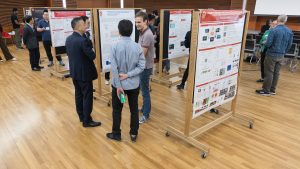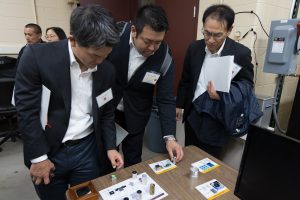
On October 22-23, UW–Madison, the Japan–America Society of Wisconsin (JASWI), and the Wisconsin Economic Development Corporation (WEDC) co-hosted over 80 attendees at the 2025 UW–Japan Engineering & Technology Forum. The College of Engineering, College of Letters and Sciences, Grainger Institute for Engineering, Office of Corporate Relations, and Office of Business Engagement all played significant roles in organizing this first event of its kind.
The vision for the forum was to bring together U.S. and Japanese industry, academia, and government, while featuring UW–Madison’s innovations in clean energy, quantum & AI, and advanced manufacturing. The event aimed to showcase cutting-edge UW research capabilities, facilitate connections between academics and companies with aligned interests, encourage mutually beneficial funding and hiring, and emphasize the unique role of the university’s institutional organizations such as the Wisconsin Alumni Research Foundation.
The College of Engineering Office of Corporate Relations director Russ Johnson thought this mission was successful. “We chose the three focus areas because those are where Japan has many aligned objectives and strong interests,” he said. “It worked out very well to partner with JASWI and WEDC to bring in executives from Japanese-based companies that have a presence in Wisconsin, the Midwest, and across the U.S. These are companies that may not have known about the capabilities of UW–Madison or the College of Engineering. I think we succeeded at that.”
Held at the Wisconsin Institute for Discovery, the October 23 program included remarks and presentations from keynote speakers, student poster sessions, and breakout tours based on the clean energy, advanced manufacturing, and quantum and AI technology areas. The in-depth tours and accompanying presentations were designed to create direct interaction between faculty, PhD students, and Japanese corporate representatives with shared research interests, highlighting UW–Madison’s labs and ongoing projects. The night ended with a dinner at the Pyle Center and then a nijikai, or after-party, for social networking at Great Dane Brewery.

There was an additional “early-bird” program on October 22 in which travelers could experience more of Wisconsin over a half-day schedule: tours of the College of Agricultural and Life Sciences Dairy Cattle Center and Exact Sciences automated laboratories, and welcome drinks at Octopi Brewing, which manufactures iconic Japanese beer Asahi Super Dry in Waunakee.
Notable speakers included Chancellor Jennifer Mnookin, Dean Devesh Ranjan (College of Engineering), Erik Iverson and Greg Keenan (Wisconsin Alumni Research Foundation), acting Consul General Naoya Kishi (Japanese Consulate in Chicago), Sam Rikkers (WEDC), Dean Eric Wilcots (College of Letters and Sciences), Russ Johnson (Office of Corporate Relations), John Garnetti (Office of Business Engagement), and Andrew Seaborg (Honorary Consul of Japan in Wisconsin). Presenters all underscored the university’s growing commitment to partnership with Japan and its recognition of Japan’s importance to Wisconsin’s innovation and economy.
Cross-institutional collaboration was a key element to the forum. Japanese representatives were introduced to faculty research initiatives that could benefit from funding or corporate support, as well as students who might be good fits for internships or open positions.

The forum also established co-hosts UW–Madison, WEDC, and JASWI as central platforms for ongoing knowledge sharing, relationship building, and collaboration between academia, industry and government. Each entity brought distinct value to the event and together ensured everything ran smoothly.
JASWI is a newly launched non-profit organization and one of the most recent additions to the 41 total Japan–America Societies belonging to the National Association of Japan America Societies in the US. Their goal is to promote and strengthen U.S.-Japan relationships in Wisconsin. Through the forum, JASWI functioned as a main connector bringing together corporate representatives and academic researchers while illustrating Wisconsin’s engineering and technology expertise to the Japanese government. Although individual collaborations already exist sporadically, the forum put interested parties in the same room, allowing organized opportunities for communication.
Kerry Clark, Executive Director of JASWI, said that the event was a great success. Japanese representatives were impressed with what they saw and especially valued their interactions with UW students. “The energy in the room was palpable,” she said. “I noticed many conversations between professors, students, and Japanese companies who all seemed to appreciate the opportunity for focused connection.”

Director Johnson agreed, noting that the opportunities to network were a main accomplishment, but especially the personal interactions shared during the poster session. “I think that was one of the highlights of the whole trip for the folks who were visiting us,” he said. “The success of this forum is evidence that we need to do this more often. The capabilities of the university—and particularly the College of Engineering—are incredible. When companies come to campus, conversations can continue, resulting in sponsored research and deeper partnerships.”
Overall, the 2025 UW–Japan Engineering & Technology Forum provided a valuable, fun experience in Madison and cultivated a growing ecosystem of engineering talent across Japan and Wisconsin. The organizers look forward to hosting similar events in the future.
• • •
Featured image: Stephanie Diem, Assistant Professor of Nuclear Engineering & Engineering Physics, gives forum attendees a tour of the Pegasus-III fusion energy machine lab—part of the clean energy interest area. Photo by Todd Brown.
Author: Bri Meyer, Research Impact and Outreach Communications Specialist